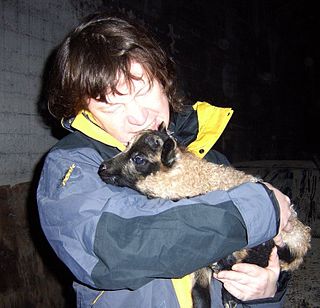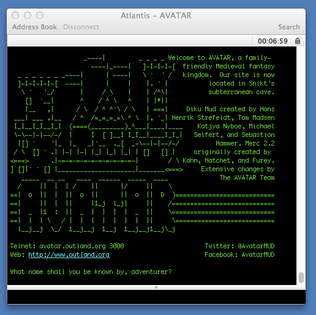A MUD is a multiplayer real-time virtual world, usually text-based. MUDs combine elements of role-playing games, hack and slash, player versus player, interactive fiction, and online chat. Players can read or view descriptions of rooms, objects, other players, non-player characters, and actions performed in the virtual world. Players typically interact with each other and the world by typing commands that resemble a natural language.
AberMUD was the first popular open source MUD. It was named after the town Aberystwyth, in which it was written. The first version was written in B by Alan Cox, Richard Acott, Jim Finnis, and Leon Thrane based at University of Wales, Aberystwyth for an old Honeywell mainframe and opened in 1987.
A talker is a chat system that people use to talk to each other over the Internet. Dating back to the 1980s, they were a predecessor of instant messaging.
DikuMUD is a multiplayer text-based role-playing game, which is a type of MUD. It was written in 1990 and 1991 by Sebastian Hammer, Tom Madsen, Katja Nyboe, Michael Seifert, and Hans Henrik Stærfeldt at DIKU —the department of computer science at the University of Copenhagen in Copenhagen, Denmark.

Online creation, also referred to as OLC, online coding, online building, and online editing, is a software feature of MUDs that allows users to edit a virtual world from within the game itself. In the absence of online creation, content is created in a text editor or level editor, and the program generally requires a restart in order to implement the changes.

Ancient Anguish, abbreviated AA, is a fantasy-themed MUD, a text-based online role-playing game. Founded in 1991 by Balz "Zor" Meierhans and Olivier "Drake" Maquelin, it opened to the public on February 2, 1992. It is free-to-play, but has been supported by player donations since 1994.
The MUD trees below depict hierarchies of derivation among MUD codebases. Solid lines between boxes indicate code relationships, while dotted lines indicate conceptual relationships. Dotted boxes indicate that the codebase is outside the family depicted.
LPMud, abbreviated LP, is a family of MUD server software. Its first instance, the original LPMud game driver, was developed in 1989 by Lars Pensjö. LPMud was innovative in its separation of the MUD infrastructure into a virtual machine and a development framework written in the LPC programming language.

A mob, short for mobile, also known as an enemy or mook, is a computer-controlled non-player character (NPC) in a computer game such as an MMORPG or MUD. Depending on context, every and any such characters in a game may be considered to be a "mob", or usage of the term may be limited to hostile NPCs and/or NPCs vulnerable to attack. Common usage refers to either a single character or a multitude of characters in a group as a mob.
"A Rape in Cyberspace, or How an Evil Clown, a Haitian Trickster Spirit, Two Wizards, and a Cast of Dozens Turned a Database into a Society" is an article written by freelance journalist Julian Dibbell and first published in The Village Voice in 1993. The article was later included in Dibbell's book My Tiny Life on his LambdaMOO experiences.
MU* is an abbreviation which refers collectively to a family of text-based multi-user virtual world servers comprising:
The Virtual Community is a 1993 book about virtual communities by Howard Rheingold, a member of the early network system The WELL. A second edition, with a new concluding chapter, was published in 2000 by MIT Press.
A MOO is a text-based online virtual reality system to which multiple users (players) are connected at the same time.
LysKOM is a KOM-based conferencing system developed by the Lysator Academic Computer Society at Linköping University and Linköping Institute of Technology. It can be seen as a cross between news and e-mail, but with the presence and speed of IRC or IM-networks. The most common client is the LysKOM Emacs Lisp Client, but among others a WWW-based client also exists. The server and most clients are released under the terms of the GNU General Public License, and thus free software. The LysKOM protocol uses port 4894.
Cyberformance refers to live theatrical performances in which remote participants are enabled to work together in real time through the medium of the internet, employing technologies such as chat applications or purpose-built, multiuser, real-time collaborative software. Cyberformance is also known as online performance, networked performance, telematic performance, and digital theatre; there is as yet no consensus on which term should be preferred, but cyberformance has the advantage of compactness. For example, it is commonly employed by users of the UpStage platform to designate a special type of Performance art activity taking place in a cyber-artistic environment.

Michael Lawrie is a British computer security and social networking expert known for many things ranging from running MUDs to accidentally being the world's first Cybersquatter. He lives in Cambridge, England where he created the Cambridge Freecycle group, one of the largest in Europe.
God or Goddess, in MUDs, often refers to an administrator of a MUD server, most typically the owner. Sometimes multiple individuals with the title of God are present, or the term may even be applied to all administrative and development staff, but it is usual for the term to refer to the most senior administrator. A similar term, mostly used in DikuMUDs, is implementer, or "imp".

Nuclear War MUD, abbreviated Nuke, is a MUD, a text-based online role-playing game, founded in 1992.

A.V.A.T.A.R. MUD is a free, online, massively multiplayer, fantasy, text-based role-playing game, set in a real-time virtual environment. It combines elements of role-playing games, hack and slash style computer games, adventure games and social gaming.





